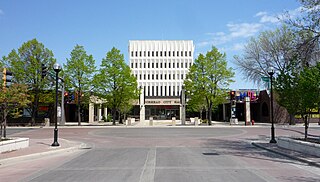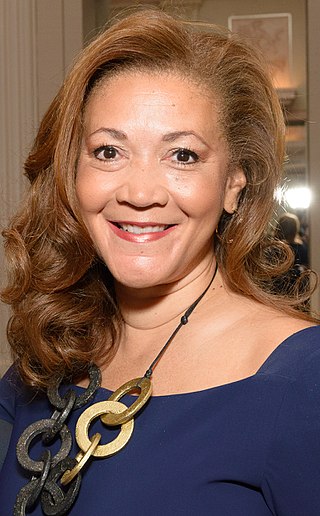See also
- Agreeableness
- Beverly Hills 90210 (TV show with Minnesota Nice tropes)
- Emotional trust
- Iowa nice
- Seattle Freeze
- Southern hospitality
Minnesota nice is a cultural stereotype applied to the behavior of people from Minnesota, implying residents are unusually courteous, reserved, and mild-mannered compared to people from other states and more akin to their Canadian neighbors in Northern Ontario. The phrase also implies polite friendliness, an aversion to open confrontation, a tendency toward understatement, a disinclination to make a direct fuss or stand out, apparent emotional restraint, and self-deprecation. [1] It is sometimes associated with passive-aggression. [2]
Playwright and corporate communications consultant Syl Jones suggested that Minnesota nice is not so much about being "nice" but is more about keeping up appearances, maintaining the social order, and keeping people (including non-natives of the state) in their place. He relates these social norms to the literary work of Danish-Norwegian novelist Aksel Sandemose, the fictional Law of Jante, and more generally, Scandinavian culture. [3] Garrison Keillor's A Prairie Home Companion discusses "Wobegonics", the supposed language of Minnesotans, which includes "no confrontational verbs or statements of strong personal preference". [4]
The generosity of state citizens has been commented on; the heavily reported influenza vaccine shortage of late 2004 did not strike the state as hard as elsewhere since many people willingly gave up injections for others. [5] The concept has also received some support from the academic community; a national study by Peter Rentfrow, Samuel D. Gosling, and Jeff Potter done in 2008 found that Minnesota was the second most agreeable and fifth most extraverted state in the nation, traits associated with "nice". [6]
The tradition of social progressivism in Minnesota politics has been linked to the Minnesota Nice culture. [7]
Since the 1960s and 1970s and continuing into the present, Minnesota has been a leading state in refugee resettlement, which can be linked to the traditions of progressivism and generosity associated with Minnesota nice. Various groups, especially Hmong from Laos and Somalis, as well as large numbers of Vietnamese, Burmese, Ethiopians, Laotians, Tibetans, and Liberians, have found homes in the state, particularly in the Twin Cities. Since 2002, Minnesota has harbored the largest population of Somalis in North America. [8]
Minnesota nice was an influence on the Coen brothers movie Fargo , set in both Minnesota and neighboring North Dakota. [9] [10] A 2003 documentary about the making of the movie was entitled Minnesota Nice. [11] [12]
History professor Annette Atkins suggests that the concept is a marketing myth, emerging from the work of Howard Mohr and Garrison Keillor in the 1980s. Atkins notes that prior to the popularity of such works, Minnesotans differentiated themselves from the people of Iowa with corny "Idiots Out Walking Around" jokes at their neighbors' expense. [2]
Journalist and Minnesota native Michele Norris argued the phrase had acquired "undertones of irony and despair" following the 2020 murder of George Floyd in Minneapolis. [13]

Minnesota is a state in the Upper Midwestern region of the United States. It is the 12th largest U.S. state in area and the 22nd most populous, with over 5.75 million residents. Minnesota is known as the "Land of 10,000 Lakes" but actually has 14,380 bodies of fresh water covering at least ten acres each; roughly a third of the state is forested; much of the remainder is prairie and farmland. More than 60% of Minnesotans live in the Minneapolis–Saint Paul metropolitan area, known as the "Twin Cities", the state's main political, economic, and cultural hub and the 16th-largest metropolitan area in the U.S. Other minor metropolitan and micropolitan statistical areas include Duluth, Mankato, Moorhead, Rochester, and St. Cloud.

A Prairie Home Companion is a weekly radio variety show created and hosted by Garrison Keillor that aired live from 1974 to 2016. In 2016, musician Chris Thile took over as host, and the successor show was eventually renamed Live from Here and ran until 2020. A Prairie Home Companion aired on Saturdays from the Fitzgerald Theater in Saint Paul, Minnesota; it was also frequently heard on tours to New York City and other U.S. cities. The show is known for its musical guests, especially folk and traditional musicians, tongue-in-cheek radio drama, and relaxed humor. Keillor's wry storytelling segment, "News from Lake Wobegon," was the show's best-known feature during his long tenure.

Minneapolis–Saint Paul is a metropolitan area in the Upper Midwestern United States centered around the confluence of the Mississippi, Minnesota and St. Croix rivers in the U.S. state of Minnesota. It is commonly known as the Twin Cities after the area's two largest cities, Minneapolis and Saint Paul. Minnesotans often refer to the two together simply as "the cities". The area is Minnesota's economic, cultural, and political center.

Moorhead is a city in and county seat of Clay County, Minnesota, United States, on the banks of the Red River of the North. Located in the Red River Valley, an extremely fertile and active agricultural region, Moorhead is also home to several corporations and manufacturing industries. Across the river from Fargo, North Dakota, Moorhead helps form the core of the Fargo–Moorhead ND-MN Metropolitan Area. The population was 44,505 at the 2020 census.

Fargo is a 1996 black comedy crime film written, directed, produced and edited by Joel and Ethan Coen. Frances McDormand stars as Marge Gunderson, a pregnant Minnesota police chief investigating a triple homicide that takes place after a desperate car salesman hires two criminals to kidnap his wife in order to extort a hefty ransom from her wealthy father. The film was an American and British co-production.
Conscientiousness is the personality trait of being responsible, careful or diligent. Conscientiousness implies a desire to do a task well, and to take obligations to others seriously. Conscientious people tend to be efficient and organized as opposed to easy-going and disorderly. They tend to show self-discipline, act dutifully, and aim for achievement; they display planned rather than spontaneous behavior; and they are generally dependable. Conscientiousness manifests in characteristic behaviors such as being neat, systematic, careful, thorough, and deliberate.

Michele Marie Bachmann is an American politician who was the U.S. representative for Minnesota's 6th congressional district from 2007 until 2015. A member of the Republican Party, she was a candidate for president of the United States in the 2012 election, but lost the Republican nomination to Mitt Romney.

Abdirizak Haji Hussein was a Somali diplomat and politician. He was the Prime Minister of Somali Republic from 14 June 1964 to 15 July 1967. From 1975 to early 1980, he also served as the country's ambassador to the United Nations. A former Secretary General of the Somali Youth League, Hussein played a leading role in the nation's early civilian administration.

Michele L. Norris is an American journalist. Since 2019, Norris has been an opinion columnist with The Washington Post. She co-hosted National Public Radio's evening news program All Things Considered from 2002 to 2011 and was the first African-American female host for NPR. Before that Norris was a correspondent for ABC News, the Chicago Tribune, and the Los Angeles Times. Norris is a member of the Peabody Awards board of directors.

Peter Ostroushko was an American violinist and mandolinist. He performed regularly on the radio program A Prairie Home Companion and with a variety of bands and orchestras in Minneapolis–Saint Paul and nationally. He won a regional Emmy Award for the soundtrack he composed for the documentary series Minnesota: A History of the Land (2005).

Agreeableness is a personality trait referring to individuals that are perceived as kind, sympathetic, cooperative, warm, honest, and considerate. In personality psychology, agreeableness is one of the five major dimensions of personality structure, reflecting individual differences in cooperation and social harmony.

The demographics of Minnesota are tracked by the United States Census Bureau, with additional data gathered by the Minnesota State Demographic Center. According to the most recent estimates, Minnesota's population as of 2020 was approximately 5.7 million, making it the 22nd most populous state in the United States. The total fertility rate in Minnesota was roughly 1.87 in 2019, slightly below the replacement rate of 2.1.
Lake Wobegon is a fictional town created by Garrison Keillor as the setting of the recurring segment "News from Lake Wobegon" for the radio program A Prairie Home Companion broadcast from St Paul, Minnesota. The fictional town serves as the setting for many of Keillor's stories and novels, gaining an international audience with Lake Wobegon Days in 1985. Described as a small rural town in central Minnesota, the events and adventures of the townspeople provided Keillor with a wealth of humorous and often touching stories.
The culture of Minnesota is a subculture of the United States with influences from Scandinavian Americans, Finnish Americans, Irish Americans, German Americans, Native Americans, Czechoslovak Americans, among numerous other immigrant groups. They work in the context of the cold agricultural and mining state.

MNopedia: The Minnesota Encyclopedia is a free English-language encyclopedia project from the Minnesota Historical Society. Funded through a Legacy Amendment Arts and Cultural Heritage Fund grant, it is the first online encyclopedia about Minnesota, a "resource for reliable information about significant people, places, events, and things in Minnesota history". Approved by Minnesotans on November 4, 2008, planning took place in 2010, the site was built in 2011 and was online on August 15; initial funding for 2010 and 2011 was $215,000. Many of the articles produced by the encyclopedia are licensed under a Creative Commons Attribution-ShareAlike 3.0 Unported License as are some of its multimedia files.
The Hmong people are a major ethnic group in the Minneapolis–Saint Paul area. As of 2000, there were 40,707 ethnic Hmong in the Minneapolis-St. Paul area. The 2010 U.S. Census stated there were 66,000 ethnic Hmong in Minneapolis-St. Paul, giving it the largest urban Hmong population in the world. Grit Grigoleit, author of "Coming Home? The Integration of Hmong Refugees from Wat Tham Krabok, Thailand, into American Society," wrote that the Minneapolis-St. Paul area "acted as the cultural and socio-political center of Hmong life in the U.S."
Somalis are an ethnic group in the Minneapolis–Saint Paul metropolitan area that makes up the largest Somali diasporas in the United States. By 2018, approximately 43,000 people born in Somalia were living in Minnesota, and approximately 94,000 Minnesotans spoke Somali language at home.
Iowa nice is a cultural label used to describe the stereotypical attitudes and behaviors of residents within the U.S. state of Iowa, particularly in terms of the friendly agreeableness and emotional trust shown by individuals who are otherwise strangers. While the term's precise meaning is difficult to define, 'Iowa nice' as a concept has been touched upon by both national publications such as The Huffington Post and Iowan publications such as The Gazette and The Quad City Times. It can be analogized to the similar notions of Minnesota nice and Southern hospitality.

The COVID-19 pandemic in Minnesota is part of an ongoing pandemic of coronavirus disease 2019 (COVID-19) in the state of Minnesota. The first confirmed case was reported on March 6, 2020.

The 2022 Minnesota Attorney General election was held on November 8, 2022, to elect the attorney general of the U.S. state of Minnesota. Incumbent DFLer Keith Ellison narrowly won reelection to a second term against Republican challenger Jim Schultz.